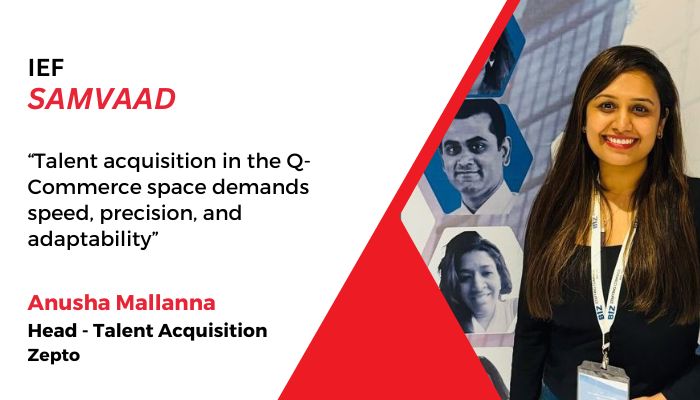Krishna Vij, Business Head (IT Staffing), TeamLease Digital, speaks to India Employer Forum about the Artificial Intelligence and transformation of the world of work, AI growth drivers, rise of Generative AI, skills necessary to prepare for AI jobs in the future and more.
Q. How is Artificial Intelligence expected to transform the world of work? Is the sense of trepidation among the workforce justified?
Artificial intelligence (AI) is expected to transform the world of work in various ways. One way is through increased automation as AI is extensively used to automate routine and repetitive tasks such as data entry and basic customer service. It is also expected to automate even more jobs, particularly those that involve manual labour or routine cognitive tasks. This is important because AI will increase productivity for overall businesses.
Second important aspect is improved decision-making. This is predominantly because AI has the potential to analyse vast amounts of data and provide insights, helping businesses make more informed decisions, faster than humans would be able to do so. As AI transforms the workplace, new job roles are likely to emerge. For example, there is a growing need for jobs pertaining to data analysts, machine learning experts, and AI system developers.
Another important aspect, what I feel particularly for the AI transforming the workplace and businesses is reskilling. While we see that some jobs are getting automated, there is also a constant demand for workers or job seekers to reskill and continuously learn new skills to stay relevant in the job market.
Regarding the sense of trepidation among the workforce, regarding the impact of AI on their job is understandable. While we feel that the overall impact of AI in the world of work is likely to be significant, it will depend on various job factors. While some jobs will become obsolete, new job roles will also emerge. AI is not expected to completely replace human beings in the workplace. Rather, it is also expected to augment human capabilities, making jobs more efficient, productive, and satisfying in the long run.
Q. What are some of the growth drivers that will boost the growth of AI in India?
I think some of the growth drivers that are actually creating a favourable environment and will aid in boosting the growth of AI are increasing internet penetration, mobile adoption, and E-commerce. India’s digital economy is growing rapidly. There will be a continuous need of growing digitization across various industries. This growth is creating a wealth of data which can be leveraged by AI in value creation.
Second most important aspect, we are saying that the government is taking a lot of initiatives to promote AI. Recently, the government has launched several initiatives such as the National AI Strategy, Startup India, and the Digital India Campaign. These initiatives collaboratively are creating a strong supporting ecosystem for development of AI and that’s where the overall benefit can be leveraged across businesses and industries put together.
Q. How can we tackle the rise of Generative AI?
We have seen that generative AI has made significant advancements in recent years. While it has its own pros and cons, it has also given both positive and negative implications, and we feel that it is indeed going to be a game changer in the tech world. With it now being used as an everyday tool across businesses, some of the ways where it can be tackled and what is important is that we need to understand its capability and also what are the ethical implications that comes with generative AI.
First and foremost important aspect is that we need to understand the regulatory framework and the guidelines that come with generative AI. So we need to understand what are the kinds of rules and regulations that we need to follow so that generative AI is used in a responsible and transparent manner. Second aspect which is very important is increasing the awareness and education about generative AI. Because while it is on the rise of usability, there is also a need to increase the potential impact where generative AI is going to help the society.
Third most important point is while generative AI is continuously on the rise and being used, but it also includes that there has to be a continued research and development which is required for the overall Industries and the initiatives that the government is taking so that there is continuous improvement on the quality, reliability, accountability, and plus we have to keep ourselves up to date with the potential threats which are associated with generative AI systems.
Q. What according to you are the key benefits and biggest challenges of adopting AI in business?
I have already highlighted a few of the benefits that businesses are already feeling and already accepting and adapting, but we see that there is a continuous transformation of businesses which are currently being viewed by using AI in this hyper-competitive world. I also spoke about the majority of the industries, specifically how AI is being integrated into more of their processes. AI brings a lot of capability where there is a large amount of data that gets processed, and it is also making faster analysis in no time.
So, I feel some of the key benefits that businesses are actually utilising and seeing are increased efficiency. Second is improved decision-making because it is also important that in a dynamic situation where you have a lot of data to analyse, you’re able to put facts behind those decisions and also be able to forecast in a better and more strategic way. Overall, customers are the key to any business, so when we are integrating AI to any processes, it has been proven that the majority of customer SLA metrics have enhanced with the integration of AI. And most importantly, we see that every business is struggling to save costs, so it is also important, while it will require a lot of huge investments at the beginning, but in the longer run, AI is also helping businesses to save a large amount of costs. That’s something I feel is a huge benefit of integrating AI into businesses.
While there are a lot of benefits that we have spoken about, there are some challenges that we have also come across, and a lot of industrial leaders have also spoken about the fact that there are a lot of challenges that businesses face. There is a huge upfront investment which is required, which I think some of the businesses might not be in a position to invest or accommodate those costs. There will be a lot of huge amounts of structured data that would be required, so some of the businesses might require streamlining their data because that’s where the analysis would be more accurate. Third most important point is there is still a lot of need for skilled professionals who understand in terms of AI integrating to systems. We still feel that while this is still evolving and there are a lot of institutes and universities that are also offering such kinds of courses and integrating and providing tech talent, which is readily available for AI, but still, there is a gap which needs to be mitigated.
Q. Can you enumerate some of the skills necessary to prepare for AI jobs in the future?
We spoke about how AI is being adopted and some job roles are getting replaced by new job roles, considering a lot of integration in the AI that is coming up. There is a constant need for employees or job seekers to constantly evolve themselves by reskilling. While AI is also opening new roles in the tech as well as the non-tech sector because, we see that a lot of adoption of AI is happening across industries, but some of the top skills that one needs to have to be future-ready include deep learning, machine learning, natural language processing, cloud computing, predictive analysis, robotics, computer vision, neural networks, and reinforcement learning. These are the few skills one can take up to be future-ready and can definitely have a promising career in AI.
Watch the full interview: In Conversation with Krishna Vij, Business Head (IT Staffing), TeamLease Digital
Krishna Vij is currently leading Captives Business within TeamLease Digital. With over 21 years of experience, she has established herself as a successful professional, by consistently delivering exceptional results and driving growth across varied industries. She is also passionate about building strong relationships with customers and creating innovative solutions with the changing market trends. Krishna has always demonstrated a remarkable ability to motivate and inspire her team to achieve their goals. She has handled large P&Ls and has been instrumental in developing strategies that have delivered significant value for the organisation.





